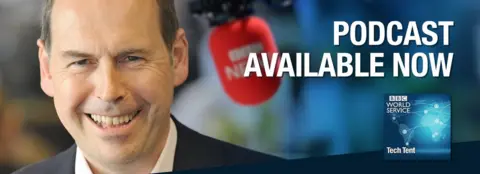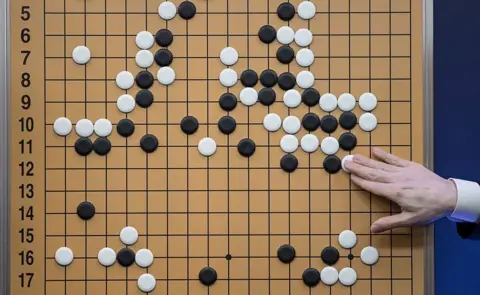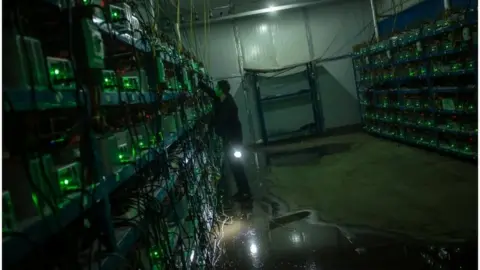Tech Tent: Will AI and Blockchain be game-changers?
 BBC
BBC- Stream or download the latest Tech Tent episode on the BBC website
- Listen to previous episodes on the BBC website
- Follow Tech Tent on Twitter

Artificial intelligence, blockchain, cryptocurrencies - three terms you need to scatter through your conversation if you want to come across as a tech guru.
On Tech Tent this week we examine these trends and ask a futurologist to predict which of them will make rapid progress over the next decade.
DeepMind passes Go - without humans
This week saw another major achievement by Google's Deep Mind, when it showed that a neural network could learn to play Go in just three days, without even looking at how humans play this complex game.
AlphaGo Zero took on the previous version of the program, developed with human expertise, and beat it by 100 games to nil.
The company now hopes to use this technique in other areas such as drug development.
This sounds like another step on the road to more generalised artificial intelligence (AI) as opposed to systems that can only excel in one function.
 Getty Images
Getty ImagesReactions to this news have ranged from terror - "another step towards the Singularity" (the idea that artificial intelligence will overtake humans) - to cynicism, with a few suggesting that mastering a board game for a second time is hardly world changing.
The man who leads the AlphaGo project, Dr David Silver, admits there is a lot of hype about AI but insists this is still an important moment: "There's reason to be excited that these systems are genuinely able to discover knowledge for themselves."
He is cautious about the speed at which practical applications will be found but still hopeful that his team's work will have a real impact on some of the biggest problems humanity is facing.
Blockchain and a magic money tree
At an event in London's Docklands we found a group of fervent believers in a new investment craze. It involves businesses which create their own currencies and use them to fund projects which depend on a technology called blockchain.
We made our way around the conference asking people to give us a clear explanation of blockchain and to explain why it was so exciting.
 Getty Images
Getty ImagesMany struggled to sum it up in a sentence.
"Blockchain is the possibility for any business to optimise their outs and ins, moneywise," said one.
"It acts as a digital ledger, it stores transaction information in blocks and each block is cross referenced against the last block," said another.
They were much more clear about its importance.
"It's the future of technology," one man told me. "If someone said, 'do you want to invest in the internet before the internet was created?' what would you have done?"
And on that belief we found firms raising unlikely sums from initial coin offerings, or ICOs, for blockchain-powered projects. Moscow-based venture Robomed, which aims to facilitate the provision of private healthcare, planned to raise $150m (£114m) in its sale of tokens.
How will they work? Well, on its website there is this explanation:
 EPA
EPA"Robomed Network issues its own tokens to support smart contract between healthcare providers and patients. RBM smart medical contract elevates service value by granting its owner full accomplishment of clinical guidelines for specific case by healthcare provider."
We struggled to understand this and other ICO business plans, and over at the Financial Times we found that Izabella Kaminska shared our bemusement.
She has been following this new form of finance for a while and is not convinced: "Why would you need an ICO to raise money? If you have a good idea you should be able to raise money."
She questions what blockchain really provides apart from what she calls "regulatory arbitrage".
She fears the main impetus for using this method of fundraising is that it does not involve all that tedious due diligence and form-filling associated with a stock market flotation.
 Amazon
AmazonThe world in 2027
Back in 2001 a book called "The Future of Wireless Communications" predicted the following technology developments by 2020:
- A personal communicator that would book flights and allow you to check in at airports.
- A personalised news feed delivered to your communicator.
- A robot that mows the grass.
- A function allowing you to pre-order your cappuccino from a coffee chain and then direct you to its location.
Those predictions look pretty accurate and now the book's author, William Webb, a telecoms consultant, is publishing his vision of how the world will look in 10 years.
His predictions include:
- Virtual assistants like Siri or Alexa will play bigger roles in our lives.
- AI will have become extremely good at specific tasks.
- In the workplace facial-recognition technology replaces security staff and robot vacuum cleaners take away cleaning jobs.
- Retailing will be almost entirely online.
But mostly he is very cautious about the pace of change. He does not believe we will all have smart homes - "the benefits are not that great but the price is quite substantial" - and he is not convinced that autonomous cars will soon be cutting congestion in cities.
"It's a nice vision," he says. "I think we will see a very limited autonomy. In 10 years we might well see cars on the motorways but I don't think we will see that in city centres - it's just too complicated."
And as for general artificial intelligence able to complete a variety of tasks, he thinks that is a long way off.
We are told that technology is advancing at breakneck speed. But if William Webb is right it may take something of a breather over the next decade.
